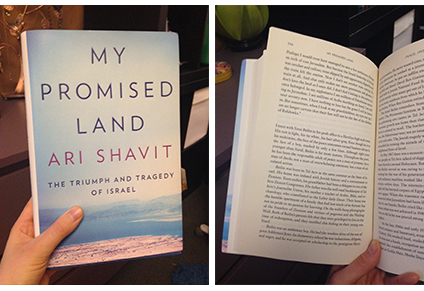Ari Shavit, Israeli reporter and columnist for Haaretz and author of the new book My Promised Land: The Triumph and Tragedy of Israel, made a quick stop at UCLA on his United States book tour — a stop which galvanized hundreds of Angelenos to clamor for tickets to the unique event, in hopes of hearing the noted journalist speak. Shavit’s new book has reached international acclaim, and has been named one of the best books of the year by both the New York Times Book Review and The Economist.
In his book, Shavit dives into the complexities that define the state of Israel. As the Jewish Journal wrote in “Living at the heart of a ‘Promised Land'”: “The anguish of the believer is not the same as that of the renegade, and Ari Shavit writes as a believer in the Zionist enterprise. Not Zionism in the mystical sense that sweeps away all reality and overlooks all issues and problems, but as a man loves his wife of many years, fully aware of her virtues, fully minded of her flaws and fully embracing the love that is at the core of their relationship. He writes of Israel as ‘we,’ not ‘they.’ He hears in the many discordant Israeli voices that often rage at one another voices that make the society thrive.”
Shavit wrote his novel in English and Hebrew simultaneously; although commissioned by Random House to write in English, Shavit shared that he was writing “for fellow Israelis.” Once Shavit spends another month or so editing the Hebrew, he thinks it will be ready to be released in Israel as well.
Before the public event to discuss his book and its success, Shavit sat down with 20 UCLA community leaders, representing such diverse campus organizations as the Undergraduate Student Association Council, Bruins for Israel, Jewish Learning Initiative on Campus, Hillel at UCLA, J-Street, the Olive Tree Initiative, the Daily Bruin, and Ha’Am, to name a few.
Shavit, sipping his coffee, stated his mission as equally instructive and receptive; he wanted to learn from students about campus climate and their thoughts as much as he wanted to impart his own opinions.
When asked about his opinion on Secretary of State John Kerry’s Israel-Palestine peace plan, Shavit responded: “While I support it, and I am the first one to celebrate it, there needs to be a plan B. I think we’re always trying to reach peace, but have to always continue to understand that it won’t happen right now.” Shavit posited that his ideal plan B would include “the Palestinians launching a nation-building process while Israel is going through [the] nation-saving process of ending occupation. It has to be cautious, gradual, and creative.”
On the subject of peace negotiations with Hamas, Shavit said: “I’m willing to have peace talks with anyone, but I remember that Hamas is wishing to destroy my nation. Their treatment of Christians, gays and women is atrocious. I’m willing to have conversation with Hamas if it converts, meaning that it will recognize Israel and drop the violence. I want to see a change in the way they handle minorities.” Pausing, Shavit then added while wagging his finger, “But don’t you dare play with me.”
Toward the end of the hour and a half meeting, students began to shift in their seats in anticipation of Shavit’s promised discussion about the Boycott, Divestment, and Sanctions movement, and, specifically, Students for Justice in Palestine’s attempt to pass a BDS resolution at UCLA. As soon as the topic was broached, the collective blood pressure of participants in the room rose, and students leaned forward to hear Shavit’s perspective. The last half hour was the divisive bomb that everyone was waiting for — but thanks to Shavit, it never fully went off.
After listening to students’ concerns, Shavit leaned back in his chair and said, “I’m not a fan. I’m into positive resolution. I think you should go into talking to people. BDS is aggressive behavior from people who say they want to promote peace […] If you want to fight what you think is wrong, have a loving dialogue in the Martin Luther King Jr. spirit. […] Israel is the most endangered country in the world, and people tend to forget that. We lost a third of our people in the Holocaust and are endangered by Iran, and people don’t want to take responsibility down the line for a much more catastrophic human disaster.”
Shavit compared vilifying Israel for human rights violations akin to “going into a fire and going after the one candle that’s burning,” when compared to the human rights violations of other countries in the Middle East, as well as in Russia and in China.
“One has to remember 1993, 2000 and 2005,” Shavit added, “when Israelis tried peace and all the times it ended in violence and national trauma. When [Israel was] endangered time and time again and people didn’t come to Israel’s aid, against the spirit of peace and human understanding.”
Still, Shavit advocates for a two-state solution and holds out hope that with careful planning, it can be possible in the distant future.
Shavit, who is currently celebrated for his nuanced reading of complex political situations, reiterated that the Israeli-Palestinian conflict is not a black-and-white issue. He repeated that he would ideally like to see some people from the far right move to the center, and some people from the far left move to the center, so that there can be dialogue. Shavit’s meeting with UCLA community leaders exemplified a positive and open-minded discussion which did not polarize the Israeli-Palestinian conflict, but acknowledged the grey area in between.

